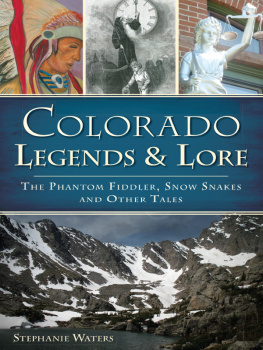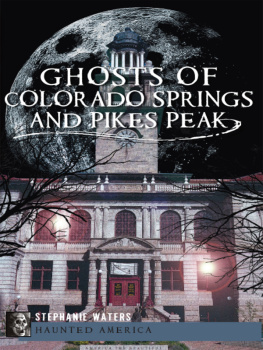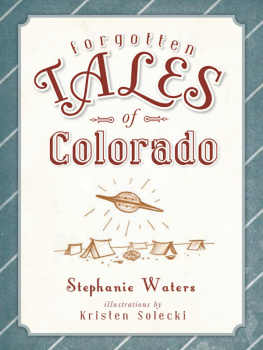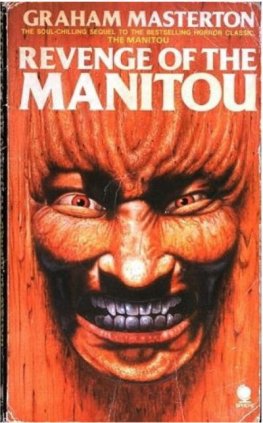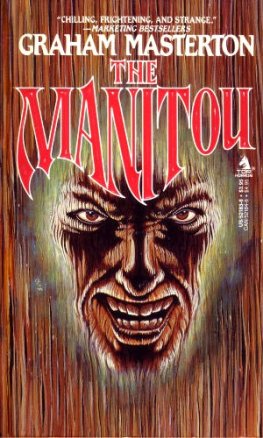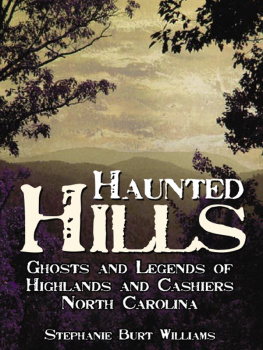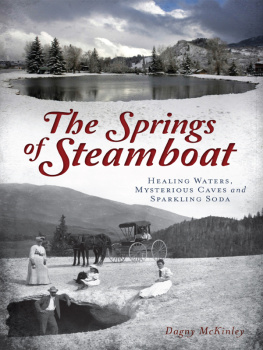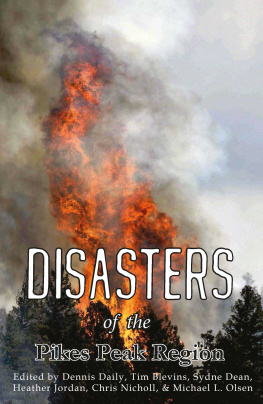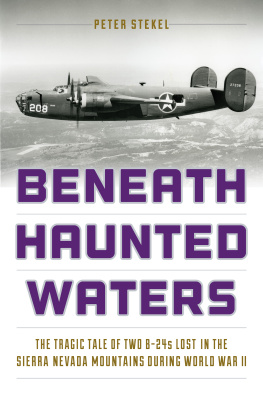Published by Haunted America
A Division of The History Press
Charleston, SC 29403
www.historypress.net
Copyright 2011 by Stephanie Waters
All rights reserved
Images are courtesy of the author unless otherwise noted.
First published 2011
e-book edition 2012
Manufactured in the United States
ISBN 978.1.61423.695.5
Library of Congress Cataloging-in-Publication Data
Waters, Stephanie.
Haunted Manitou Springs / Stephanie Waters.
p. cm.
Includes bibliographical references (p. ).
print ISBN 978-1-60949-347-9
1. Ghosts--Colorado--Manitou Springs. 2. Haunted places--Colorado--Manitou Springs. I. Title.
BF1472.U6W38 2011
133.10978856--dc23
2011025152
Notice: The information in this book is true and complete to the best of our knowledge. It is offered without guarantee on the part of the author or The History Press. The author and The History Press disclaim all liability in connection with the use of this book.
All rights reserved. No part of this book may be reproduced or transmitted in any form whatsoever without prior written permission from the publisher except in the case of brief quotations embodied in critical articles and reviews.
ACKNOWLEDGEMENTS
A big thanks to The History Press for believing in me and to my commissioning editor, Becky LeJeune, as well as to my project editor, Ryan Finn, and everyone else in production for making me look smart. Also, I want to express my gratitude to the Pikes Peak Library District and Pikes Peak regional historians, as well as for computers and the World Wide Web.
Writing this book became a personal odyssey; special thanks go to all my friends and family who supported me along my journey.
Special thanks to Dad, Mom, Tom, Bix, Everett, Kristy, Kameron, Siddhartha, Mary Jane and Monkeys.
INTRODUCTION
WHY DID I BECOME A MANITOID?
I vividly remember my first visit to Manitou Springs, Colorado. It was the summer of 1969. My family had just moved to Colorado Springs from Southern California. I was a recent kindergarten graduate, and to celebrate, my family went to visit what my astute father called the hippie village under Pikes Peak. I, however, thought of Manitou as the home of the Indians and couldnt wait to go shopping!
We stopped at the old Ute Trading Post on the way into town. Grandma Jessie bought my brother a cool rubber tomahawk and me an authentic Indian necklace. Grandpa joked that the tiny white beads were made from cats teeth. I believed him and felt brave wearing something around my neck made from the shattered bones of felines.
Grandma told us that the valley had been a vacation spot since the beginning of time. The American Indians used to make pilgrimages to the valley via Ute Pass. Warring tribes considered the springs to be holy, put down their weapons and wiped off their war paint before entering the sacred valley. When French trappers first explored the area, they found beads and trinkets left near the banks of the springs as offerings. The Victorians also realized the springs curative value, and when a tuberculosis epidemic occurred in the late 1800s, thousands of people flocked to Manitou Springs, as mineral water and fresh mountain air were considered the only cures for the deadly disease.
After the history lesson, we went to the penny arcade, then to the giant turquoise blue Ute Indian chief fountain. I can still recall the refreshing fizzy lemonade that we made from the mineral water we collected from its basin. After lunch, we tossed a few coins over the old stone bridge in Soda Springs Park. Grandma Jessie said that it was a toll fee for the resident troll. Manitou Springs seemed like a fairy tale village to me, with its charming hillside cottages and its many stone fences, walls and bridges. As we rolled out of town in my grandparents little red convertible bug, my brother and I flashed the peace sign to a group of barefooted hippies, and they reciprocated. We laughed until we cried. I remember how cool I thought those teenagers were and vowed that, someday, I would walk around Manitou barefoot. That was more than forty years ago, yet people in Manitou are still just as friendly. I often joke that although the town looks more yuppified now, the people are still the same.

Antique postcard of one of Manitou Springs many charming stone bridges.
My grandmother Jessie use to say that you dont find ManitouManitou finds you. Many of the towns residents moved to the hamlet because they felt drawn to the little mountain village. Manitou Springs seems to attract liberated, creative-type individuals, like writers, dancers, actors, singers, paintersin a nutshell, artists. They call themselves Manitoids, and their common manifesto is to Keep Manitou Weird. Manitou Springs has had a reputation for being weird ever since I can remember, and it is often jokingly referred to as Manizoo. The moniker was used long before the chamber of commerce started hosting unique festivals several times a year. People come from all over the country to gather for the annual Emma Crawford coffin races in October, and the New Years Great Fruitcake Toss is another well-known and popular event.
Where else but Manitou can you see homes that resemble caves, pyramids and castles, all in the same neighborhood. You almost feel like you are in some kind of historical, artistic time warp. In Manitou, almost anything goes; there are no strict covenants or codes about how to paint your house or landscape your yard, and artistic license is freely given. One Santa Festyle house near the historic Miramont Castle is xeriscaped and boasts a life-sized statue of a rhinoceros posed in Colorado native grass. The metallic spaceship silver hue spray painted over the entire rhino is a nice touch, although Im not quite sure what the artist is trying to convey. The neighbor down the street, also an artist, has three German shepherds that are always seen lounging around on the roof. My five-year-old niece assumed that dogs in Manitou could fly until she realized that the hounds were climbing out the second-story dormer window.
Im one of several Manitoids in town who drive a hearse. I drive mine for work. I have owned Blue Moon Haunted History Tours in Manitou Springs since 2002.
In 2009, I was diagnosed with the Big C. Fortunately, I caught it early. It was a wakeup call, as any cancer survivor will tell you. I was reminded that there were still a few things I wanted to do before I die. One of the items on my bucket list was to write a book of ghost stories about Manitou Springs. You can just imagine how delighted I was when The History Press contacted me while I was recuperating last year to see if I might be interested in writing a book about the haunted history of Manitou Springs. I have never considered myself a writer, but I took a leap of faith and gladly accepted the offer.
I tried to write a book that I would want to read. Im a self-professed history geek; therefore, all of the stories are true and verified by historical facts. Many times I have investigated an alleged haunted location, but no one knows why or what even haunts the place. Especially amusing are the establishments that claim that the place is haunted but




